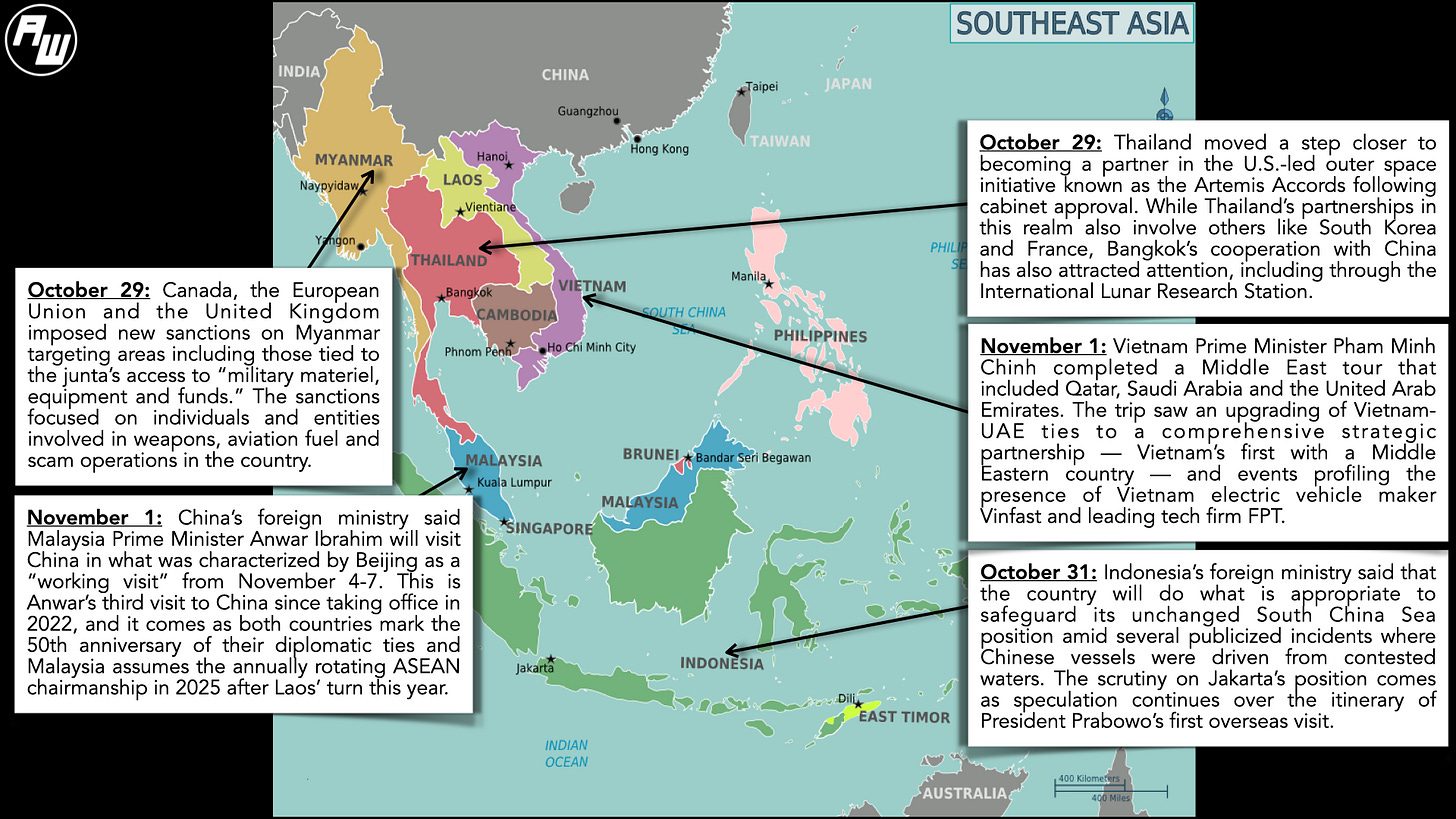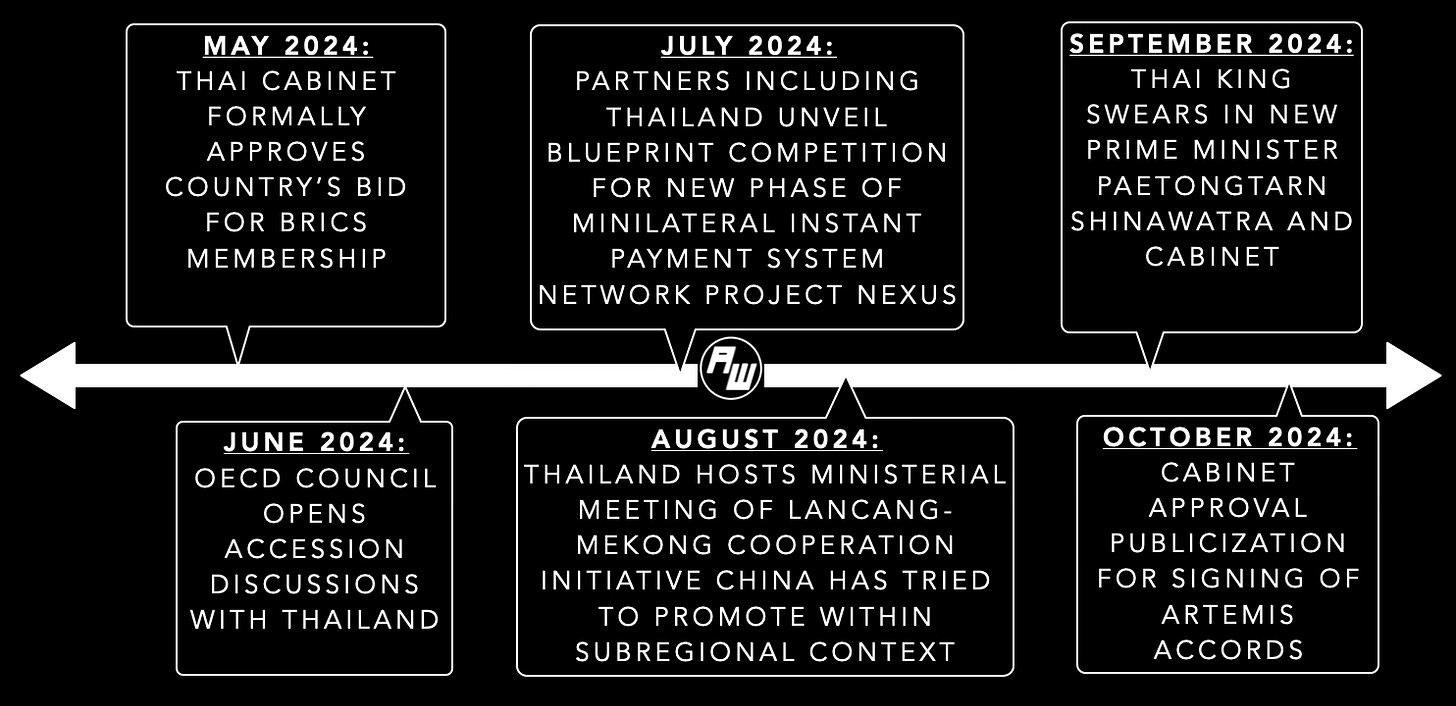New Thailand Space Bid With Artemis Accords Amid US-China Race
Plus new cross-continental partnership; trilateral sectoral; drone hub talk; AI pact; China minilateral spotlight; energy geoeconomics and much, much more.
Greetings to new readers and welcome all to the latest edition of the weekly ASEAN Wonk BulletBrief! If you haven’t already, you can upgrade to a paid subscription for $5 a month/$50 a year below to receive full posts by inserting your email address and then selecting an annual or monthly option. You can visit this page for more on pricing for institutions, groups as well as discounts. For current paid subscribers, please make sure you’re hitting the “view entire message” prompt if it comes up at the end of a post to see the full version.
For this iteration of ASEAN Wonk BulletBrief, we are looking at:
Assessing the geopolitical and geoeconomic significance of the context for Southeast Asian states in the U.S.-China space competition spotlighted with recent developments in Thailand;
Mapping of regional developments including a new cross-continental partnership; maritime scrutiny and expanded restrictions;
Charting evolving geopolitical, geoeconomic and security trends such as fresh trilateral sectoralism; drone hub talk; new AI pact and more;
Tracking and analysis of industry developments and quantitative indicators including China minilateral spotlight; unpacking energy geoeconomics and new economic agreements.
This Week’s WonkCount: 2,249 words (~10 minutes)
Cross-Continental Partnership; Maritime Scrutiny; Expanded Restrictions & More

State Enterprise Power; Fragmented Futures and Trade Competitiveness Outlook
“States play a growing role as owners of enterprises,” concludes a new report by the Organization for Economic Cooperation and Development examining the ownership and governance of state-owned enterprises for 2024. The report acknowledges that SOEs have become increasingly major players, with the number among the Fortune 500 companies list nearly quadrupling from 34 to 126 from 2020 to 2023. That said, they vary by geographic distribution, with the market capitalization of listed firms with more than 25 percent public sector ownership just under 2 percent in the OECD area vs. 16 percent in Latin America and Asia excluding China and Japan, with Beijing recording 47 percent. The report also notes variances in practices including ownership policies, preferential treatment as well as disclosure, transparency and accountability (link).
Public Sector Ownership By Market (Depiction of Calculated End 2023 Numbers)
“[A] unit increase in political distance with an FDI partner decreases FDI stock by 23%-29%, with the US-China trade conflict amplifying this effect by six to seven percentage points,” concludes a new joint cross-continental research report on geoeconomic fragmentation and effects on Asian and European economies by the ASEAN+3 Macroeconomic Research Office and the European Stability Mechanism. The report’s regression results show that while shifting political alignment is negatively associated with FDI with the escalation in US-China trade conflict (note graphic below on growing US-China distance 2017 vs. 2022 as en example), this trend did not apply to the majority of ASEAN+3 economies (link).
Minimum Spanning Trees and Distance Changes in Political Alignment Including US vs. China (2017 vs. 2022 Depicted)
“Results of this 2024 poll show that the United States losing trade competitiveness due to trade with Asia is more concerning to elites than the general public,” notes a survey conducted by the National Opinion Research Center at the University of Chicago and published by the East-West Center on the eve of the 2024 U.S. presidential elections. 53 percent of elites are moderately or extremely concerned about eroding U.S. competitiveness, relative to 36 percent of the general public. Elite-public disparities are also visible with respect to specific areas to varying degrees, including bilateral deals and sectoral ones on critical minerals and the clean energy transition (link).
Responses to Survey Question: “Do You Favor, Oppose or Neither Favor Nor Oppose the United States Taking the Following Actions with Asia?”
New Thailand Space Bid With Artemis Accords Amid US-China Race
What’s Behind It
Thailand has moved a step closer to formal affiliation with a key space pact. Cabinet approval of a move for Bangkok to sign the U.S.-led Artemis Accords setting out principles on outer space cooperation — part of a process ASEAN Wonk understands from officials had been ongoing for months — occurred during an active month in Thailand’s institutional engagement1. In the same week, Thailand attended the latest BRICS grouping summit in Russia and formally kicked off its accession process to the Organization for Economic Cooperation and Development (OECD) grouping2. Earlier in the month, Prime Minister Paetongtarn Shinawatra who officially took office in September was at the Asia Cooperation Dialogue summit designed to promote wider continental Asia cooperation as part of her first overseas trip, with Thailand set to chair the grouping next year3. Thailand’s role on regional issues including proposals on Myanmar have also been playing out within ASEAN, with summitry just having concluded in Laos and the transition to Malaysia’s chair year4.
Select Key Recent Developments Related to Institutional Engagement and Thailand
The move spotlighted the role of Southeast Asian states in general and Thailand in particular within the outer space arena amid ongoing major power competition. As we have noted previously on ASEAN Wonk, Thailand, a U.S. treaty ally which also pursues active engagement with China, had been among the early movers in joining with China-linked mechanisms like the International Lunar Research Station (ILRS), which Beijing has promoted along with Russia and is often referred to alongside the Artemis Accords despite their varying nature5. Several Southeast Asian governments have also engaged with the Artemis Accords in particular. Singapore became the first ASEAN country to sign on to the Artemis Accords in May 20226. ASEAN Wonk also understands that some governments expressed concerns about terms of engagement even though they do pursue multipartner cooperation in the space domain, while the Philippines has already indicated publicly it is willing to join the agreement7. More broadly, Southeast Asian officials have also signaled anxiety at the increasing fragmentation of wider global conversations around outer space8.
Why It Matters
Thailand’s move towards the pact also highlighted wider outer space-related developments within Southeast Asia amid intensifying geopolitical competition and key datapoints amid regional and global developments (see originally generated ASEAN Wonk table below on notable developments on areas and outcomes, as well as additional details on positions. Paying subscribers can also read on for more on what to expect and future implications in the rest of the “Why It Matters” and “Where It’s Headed” sections, along with remaining paid-only sections of the newsletter as usual)











